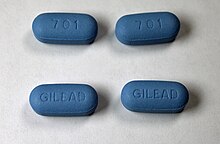
Pre-exposure prophylaxis for HIV prevention, commonly known as PrEP, is the use of antiviral drugs as a strategy for the prevention of HIV/AIDS by people that do not yet have HIV/AIDS.[1] PrEP is one of a number of HIV prevention strategies for people who are HIV negative but who have a higher risk of acquiring HIV, including sexually active adults who are at increased risk of contracting HIV, people who engage in intravenous drug use (see drug injection), and serodiscordant sexually active couples.[2]
The first form of PrEP for HIV prevention - emtricitabine and tenofovir disoproxil (FTC/TDF; Truvada) - was approved in 2012.[3] In October 2019, the US Food and Drug Administration (FDA) approved the combination of emtricitabine and tenofovir alafenamide (FTC/TAF; Descovy) to be used as PrEP besides Truvada, which provides similar levels of protection.[4] Descovy, however, is only currently approved for cisgender males and transgender women, as the efficacy has not been assessed in people at risk through receptive vaginal sex.[2]
In December 2021, the FDA approved cabotegravir (Apretude), which is an injectable form of PrEP manufactured by ViiV. Regulators believe it will improve medication adherence because it only has to be taken once every two months, and will also widen adoption as it eliminates the need to hide pills or pharmacy visits for discretion.[5]
As of their 2021 guidelines, the World Health Organization (WHO) recommends multiple forms of PrEP for HIV prevention:[6]
- Oral PrEP using TDF-containing compounds for anyone at substantial risk of HIV infection;
- Event-driven PrEP for men who have sex with men; and
- The dapivirine vaginal ring (DPV-VR) for women at substantial risk of HIV infection who do not have access to oral PrEPs.[6]
This article provides information regarding PrEP medical uses, contraindications and side effects, societal and cultural perspectives on its usage, and recent research studies concerning PrEP.
- ^ "Pre-Exposure Prophylaxis". HIV.gov. 3 December 2019. Retrieved 3 August 2020.
- ^ a b Cite error: The named reference
:5was invoked but never defined (see the help page). - ^ "Oral PrEP TDF/FTC". PrEPWatch. 17 February 2023. Retrieved 23 August 2023.
- ^ "FDA approves the second drug to prevent HIV infection as part of ongoing efforts to end the HIV epidemic". U.S. Food and Drug Administration (FDA) (Press release). 3 October 2019. Archived from the original on 10 October 2019. Retrieved 10 October 2019.
 This article incorporates text from this source, which is in the public domain.
This article incorporates text from this source, which is in the public domain.
- ^ "FDA Approves First Injectable Treatment for HIV Pre-Exposure Prevention". U.S. Food and Drug Administration. 20 December 2021. Retrieved 20 April 2022.
- ^ a b Consolidated guidelines on HIV prevention, testing, treatment, service delivery and monitoring: recommendations for a public health approach. Geneva: World Health Organization. 2021.